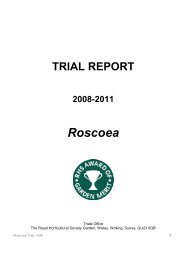Xylella fastidiosa
xylella-fastidiosa-impl-trade
xylella-fastidiosa-impl-trade
Create successful ePaper yourself
Turn your PDF publications into a flip-book with our unique Google optimized e-Paper software.
What are the new controls?<br />
Anyone importing host plants from the EU needs to ensure that they are<br />
accompanied by a valid plant passport confirming they have been sourced from<br />
disease free areas/sites.<br />
The already extensive list of host species is likely to grow and includes species of oak,<br />
maple, hebe, lavender, rosemary and many other popular plants for gardens, landscapes<br />
and forestry. The host list will be updated frequently and is available at<br />
http://ec.europa.eu/food/plant/plant_health_biosecurity/legislation/emergency_measures/in<br />
dex_en.htm .<br />
A new plant passporting obligation for all ‘professional operators’ has been introduced,<br />
requiring that the movements of all ‘host plants’ across the EU must be accompanied by a<br />
plant passport – see Annex 1 for hosts as of January 2016. In practice this means that<br />
landscapers, designers, retailers and anyone directly importing plants are now subject to<br />
the same stringent measures as growers and suppliers. The plant passport can be used to<br />
underpin and help businesses record audits and include in assurance schemes plants they<br />
have received or traded, as this in turn can help investigations into potential finds of the<br />
disease or limit any actions taken at premises. Find out more about plant passports here:<br />
https://www.gov.uk/guidance/plant-health-controls<br />
For nurseries already authorised to plant passport the UK Plant Health Services are not<br />
planning to carry out additional growing season inspections for X. <strong>fastidiosa</strong> prior to early<br />
summer 2016, unless the presence of the disease is suspected. Passporters however will<br />
be expected make contact with their local Plant Health Inspector if they trade in a <strong>Xylella</strong><br />
host not previously covered so their authorisation to passport can be extended. Any<br />
nursery not previously authorised to trade in material covered by the plant passporting<br />
scheme should also contact their local Plant Health inspector to find out what may be<br />
required. Contact details are at the end of this guide.<br />
Leaf scorch caused by <strong>Xylella</strong> <strong>fastidiosa</strong> on a Coffea originating from Ecuador (Interception) Courtesy:<br />
Bruno Legendre. Anses, Plant Health Laboratory, Angers (FR)<br />
Page 3



